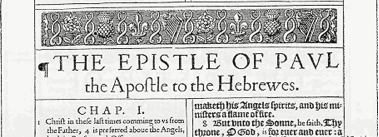(I wrote this in an essay on Hebrews a few years back)
Origen (185-254 CE) in the East has been quoted as saying that God only knows who wrote the Epistle although he also suggested that Paul was the author (Robertson, 1932). Hippolytus (170-236 CE) from Rome denied it was written by Paul. Tertullian (160-220 CE) in North Africa spoke of an Epistle of Barnabas to the Hebrews (Vincent, 1886). At the councils of Carthage (397& 419 CE) it was accepted that Hebrews was Pauline and was affirmed in the council of Trent (1545-1563) (Vincent, 1886). During the reformation doubt was again put on the authorship as Luther (1484-1546) said it was written by Apollos (Robertson, 1932) and Calvin (1509-1564) denied it was Pauline (Vincent, 1886). Adolf von Harnac (1851-1930) suggested that Priscilla may have been the author but Robertson (1932) highlights that Hebrews 11:32 mentions a masculine participle that dismisses this theory.
The Epistle itself provides some information about the author. The author was a friend of Timothy (13:23) and was possibly writing in Italy (13:24), although this verse may mean “those who are originally from Italy”. In Hebrews 2:3 the author includes himself in receiving the message of salvation from those who first heard it, thus making it likely the author was not an Apostle but a second generation convert (Achtemeier, Green, & Thompson, 2001, p. 467). Throughout Hebrews the author attributed all of the Scriptural quotes to God. This use of Scripture suggests that the author believed the Old Testament to be the inspired word of God. The author had knowledge of the Jewish system leading many to think that the author was Jewish. All copies of the Epistle that have been found were written in polished Greek and not in Hebrew, indicating that the author was educated (Achtemeier, Green, & Thompson, 2001, p. 469). The author also used the Greek Septuagint and not a Hebrew Old Testament to quote from, probably due to the large Hellenistic influence of the time.
Also (this wasn't in my essay) in 5:11, 6:9, 11 etc the author refers to themselves as "we" suggesting that Hebrews may have been co-authored, perhaps in the same way that Philippines and Philemon is written by Paul and Timothy (Phil 1:1, Philemon 1).
Citations
Achtemeier, P. J., Green, J. B., & Thompson, M. M. (2001). Introducing the New Testament: its literature and theology. Grand Rapids, Michigan: Wm. B. Eerdmans Publishing Company.
Robertson, A. T. (1932). Word pictures in the New Testament. Nashville: Broadman.
Vincent, M. R. (1886). Vicent word studies in the New Testament. Hendrickson Publishers.

